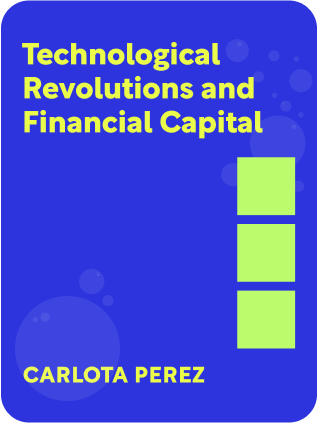

This article is an excerpt from the Shortform book guide to "Technological Revolutions and Financial Capital" by Carlota Perez. Shortform has the world's best summaries and analyses of books you should be reading.
Like this article? Sign up for a free trial here .
What is the next technological revolution? What phase of industrial revolution are we in, and can we tell where it’s going?
These are some of the discussion questions to consider after reading Technological Revolutions and Financial Capital. In the book, Carlota Perez examines the origins of industrial revolutions and the conditions that make them possible.
Consider the question “what is the next technological revolution?” and more with these Technological Revolutions and Financial Capital discussion questions.
Questions to Ponder: What Is The Next Technological Revolution?
Knowing the concepts of Technological Revolutions and Financial Capital, consider where we are now, and think about the next technological revolution.
The Current Information Age
Which of the four phases are we in now?
- Many in the tech industry, like Marc Andreessen, believe we’re in the deployment phase. “Software is eating the world.”
- Carlota Perez disagrees, saying we’re still at a turning point, and the 2001 and 2008 bubbles were a double bubble. In her view, finance continues to be decoupled from production; inequality and hopelessness are still the popular ethos. If we were in a golden age, everyone would be feeling it, like in Deployment post-WWII.
If we are in deployment, what industries are the best candidates for deployment?
- Information-intensive industries only superficially affected by the internet to date – education, healthcare, law, government.
When will we transition into Maturity?
Predicting the Next Technological Revolution
What are possible candidates for the next technological revolutions? Remember that they tend to start with cheap disruption (like microprocessors) and allow cost-competitive innovations
What technologies were hyped as the new wave that then faltered? In other words, what seeming “revolutions” were false positives? How do you tell these are false positives as they’re happening?
The location of the revolution can change. Britain was the center of the industrial revolution, but the US became the center of future revolutions. Where might the next technological revolution arise?
The next technological revolution is incompatible with the current paradigm. What are disruptive technologies that would threaten today’s paradigm, and are thus resisted today?
What technologies would make existing titan companies obsolete?
Finance tends to adopt new technology early. Can you use financial innovation and new organizational models as harbingers for the larger technological revolution to come?

———End of Preview———
Like what you just read? Read the rest of the world's best book summary and analysis of Carlota Perez's "Technological Revolutions and Financial Capital" at Shortform .
Here's what you'll find in our full Technological Revolutions and Financial Capital summary :
- What happened during the 2000 tech bubble and the 2002 crash
- The 5 technological revolutions that reshaped society since 1771
- How you might be able to predict and prepare for the next technological revolution






